- You are here:
- Home »
- Desk Comparisons »
- L Shaped Desk vs Corner Desk: Which is the Best for Your Workspace?
L Shaped Desk vs Corner Desk: Which is the Best for Your Workspace?
As an Amazon Associate I earn from qualifying purchases.
When it comes to setting up your home office, choosing the right desk is a crucial decision. Two popular options are L-shaped desks and corner desks. Both offer unique benefits and drawbacks, so it’s important to understand the differences between them to make an informed decision.
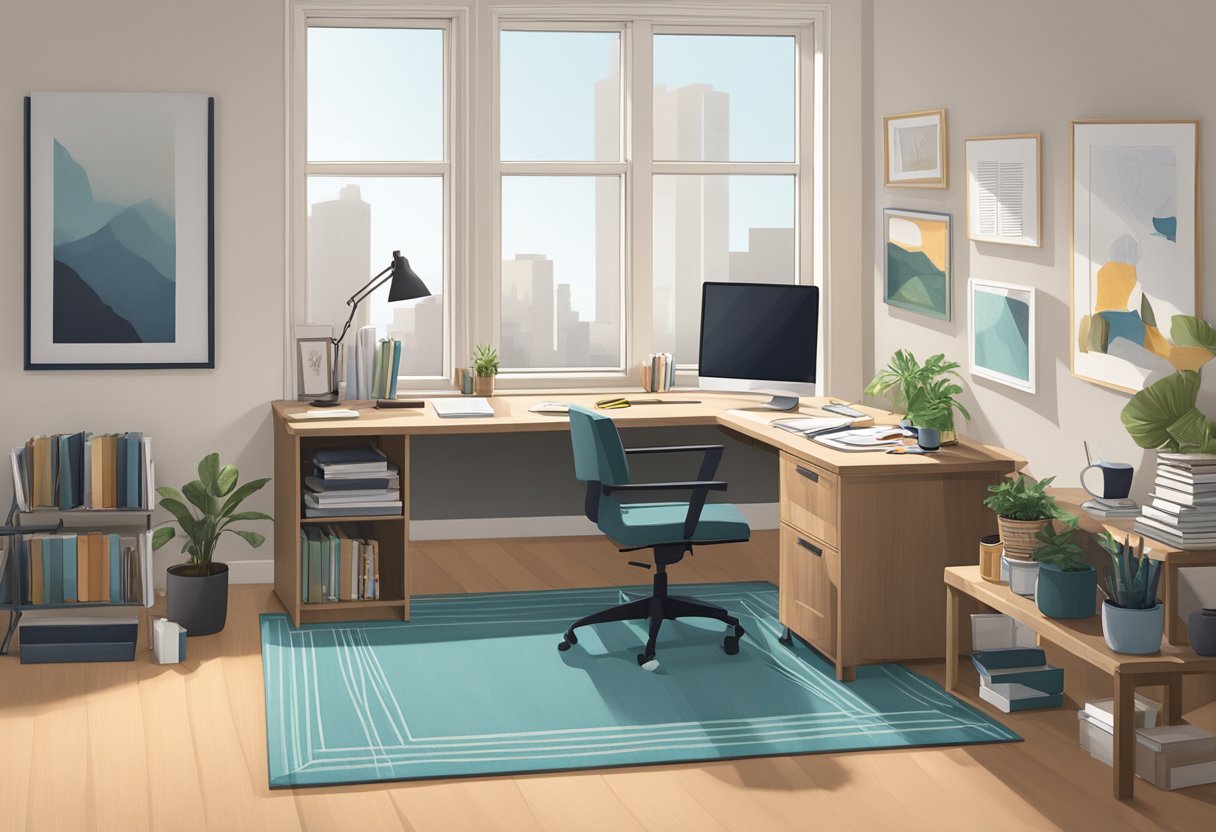
L-shaped desks are designed to fit into a corner, creating a spacious work area that can accommodate multiple monitors, paperwork, and other office essentials. They typically feature a large surface area that provides ample space for spreading out and working comfortably. On the other hand, corner desks are designed to fit snugly into a corner, making them a great choice for smaller spaces. They tend to be more compact than L-shaped desks, but they still offer plenty of workspace for most users.
Key Takeaways
- Understanding the differences between L-shaped and corner desks can help you choose the right option for your home office.
- L-shaped desks offer a larger work surface and more space for multiple monitors and other office essentials, while corner desks are ideal for smaller spaces.
- Consider your specific needs and workspace requirements when choosing between these two popular desk options.
Understanding Desk Shapes
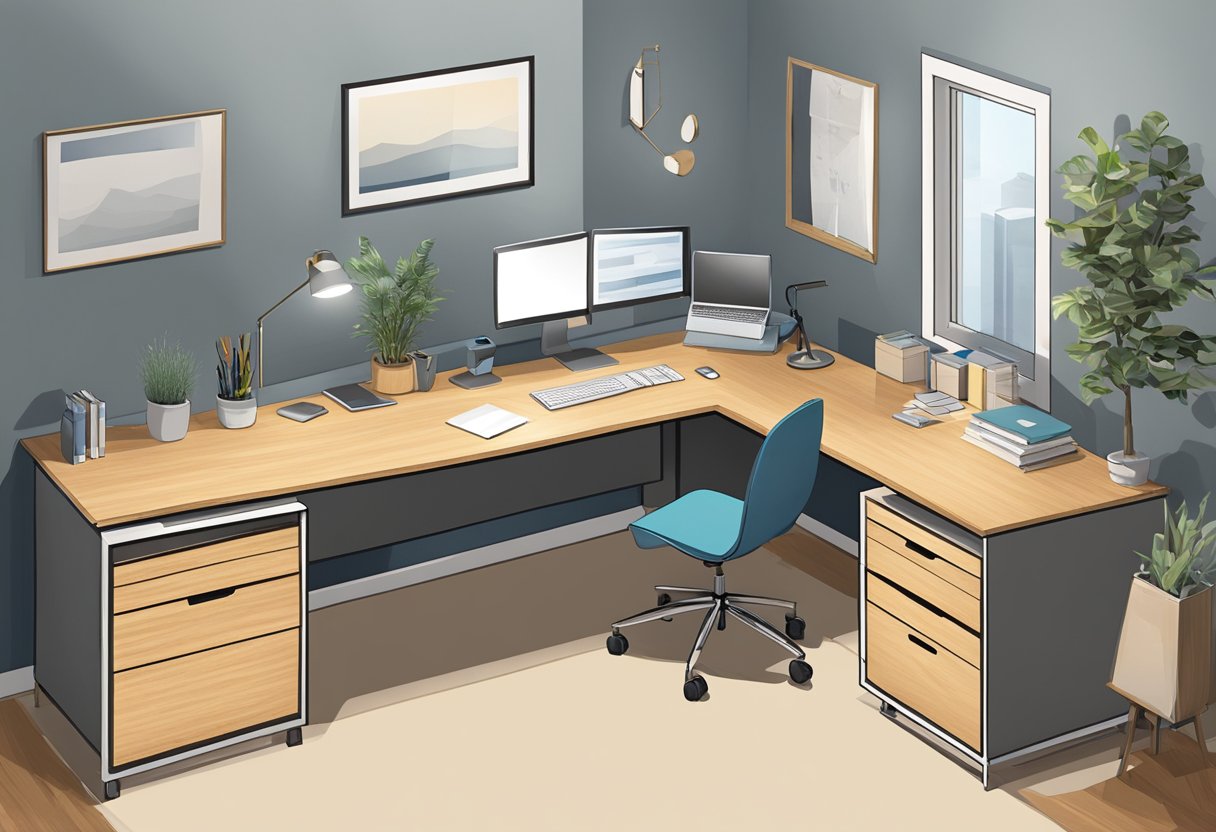
When it comes to choosing a desk, the shape is an important factor to consider. The two most common shapes are L-shaped and corner desks, but there are also straight and rectangular desks available. The shape of your desk can affect your productivity, comfort, and the overall look of your workspace.
L-Shaped Desk
An L-shaped desk is a popular choice for those who need more workspace. It consists of two adjoining surfaces that form an L shape, with one surface longer than the other. This shape provides a lot of surface area for you to work on, and it’s great for multitasking. You can have your computer on one side and your paperwork on the other. L-shaped desks are also great for corner spaces, as they make use of the space efficiently.
Corner Desk
A corner desk is similar to an L-shaped desk, but it is designed to fit snugly into a corner. This shape is perfect for those who have limited space but still need a lot of workspace. Corner desks are often more compact than L-shaped desks, and they can be a great way to make use of an unused corner in your room.
Straight Desk
A straight desk is a simple rectangular desk with no additional angles or curves. This shape is ideal for those who need a lot of workspace but have limited space. Straight desks are often more affordable than L-shaped or corner desks, and they can be a great choice for students or those who work from home.
Shape and Orientation
The shape and orientation of your desk can affect your productivity and comfort. L-shaped and corner desks are great for multitasking, while straight desks are better for focused work. You should also consider the orientation of your desk. If you’re right-handed, you may want to choose a desk that is designed for right-handed use. Similarly, if you’re left-handed, you should choose a desk that is designed for left-handed use. This will help you work more comfortably and efficiently.
In conclusion, the shape of your desk is an important factor to consider when setting up your workspace. L-shaped and corner desks are great for multitasking, while straight desks are better for focused work. You should also consider the orientation of your desk to ensure that you work comfortably and efficiently.
Choosing the Right Desk for Your Space
https://www.youtube.com/watch?v=WLv6tK-_N5c&embed=true
When it comes to choosing between an L-shaped desk and a corner desk, it’s important to consider the space you have available. Both options can provide ample working space, but their layouts and sizes can vary significantly.
If you have a home office or workspace with limited floor space, a corner desk might be the best option for you. These desks fit snugly into a corner, making them a great choice for maximizing your working space without taking up too much room. They can also be a good choice if you have walls that you want to use for storage or decoration.
On the other hand, if you have more room to work with, an L-shaped desk might be a better fit. These desks provide more surface area for working and can be a good choice if you need to spread out your work or have multiple monitors or devices. They can also be a good choice if you have a specific room layout or office layout that you need to work around.
When it comes to desk size, both L-shaped and corner desks can come in a variety of sizes to fit your needs. It’s important to measure your space and consider what you’ll be using the desk for before making a decision. You don’t want a desk that’s too small for your needs, but you also don’t want one that takes up too much space.
In summary, choosing the right desk for your space comes down to considering your available working space, room layout, and desk size needs. Both L-shaped and corner desks can be great options, but it’s important to choose the one that fits your specific needs and space constraints.
Material and Design Considerations
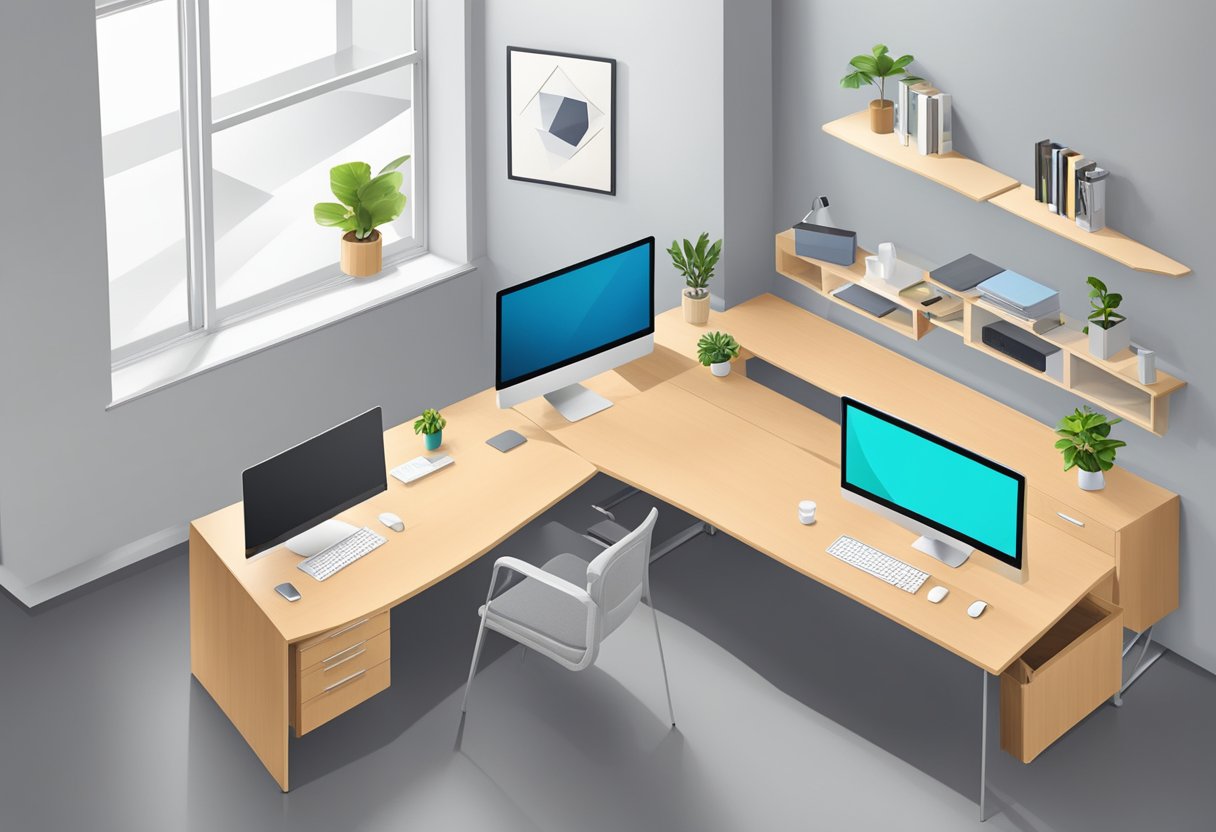
When it comes to choosing between an L-shaped desk and a corner desk, material and design are important considerations to keep in mind. Both desks come in a variety of materials such as wood, steel, metal, glass, and manufactured wood. Each material has its own unique characteristics and benefits.
Wooden desks are a popular choice for those who prefer a traditional desk style. They are sturdy, durable, and come in a variety of wood types and finishes. Steel and metal frames are also sturdy and durable, and they provide a modern look to your workspace. Glass desks are sleek and modern, but they may require more maintenance than other materials.
Manufactured wood, such as laminate, is a cost-effective option for those who want the look of wood without the high price tag. Carbon fiber is a newer material that is lightweight and strong, but it may be more expensive than other materials.
In terms of design, L-shaped desks are ideal for those who need more workspace. They provide two separate work areas and can fit into a corner or against a wall. Corner desks, on the other hand, are designed to fit into a corner and provide a single workspace. They are ideal for those who have limited space but still need a functional workspace.
When choosing between an L-shaped desk and a corner desk, consider your specific needs and preferences. Think about the materials and design that will best suit your workspace and provide the functionality you need.
Features and Accessories for Optimal Productivity
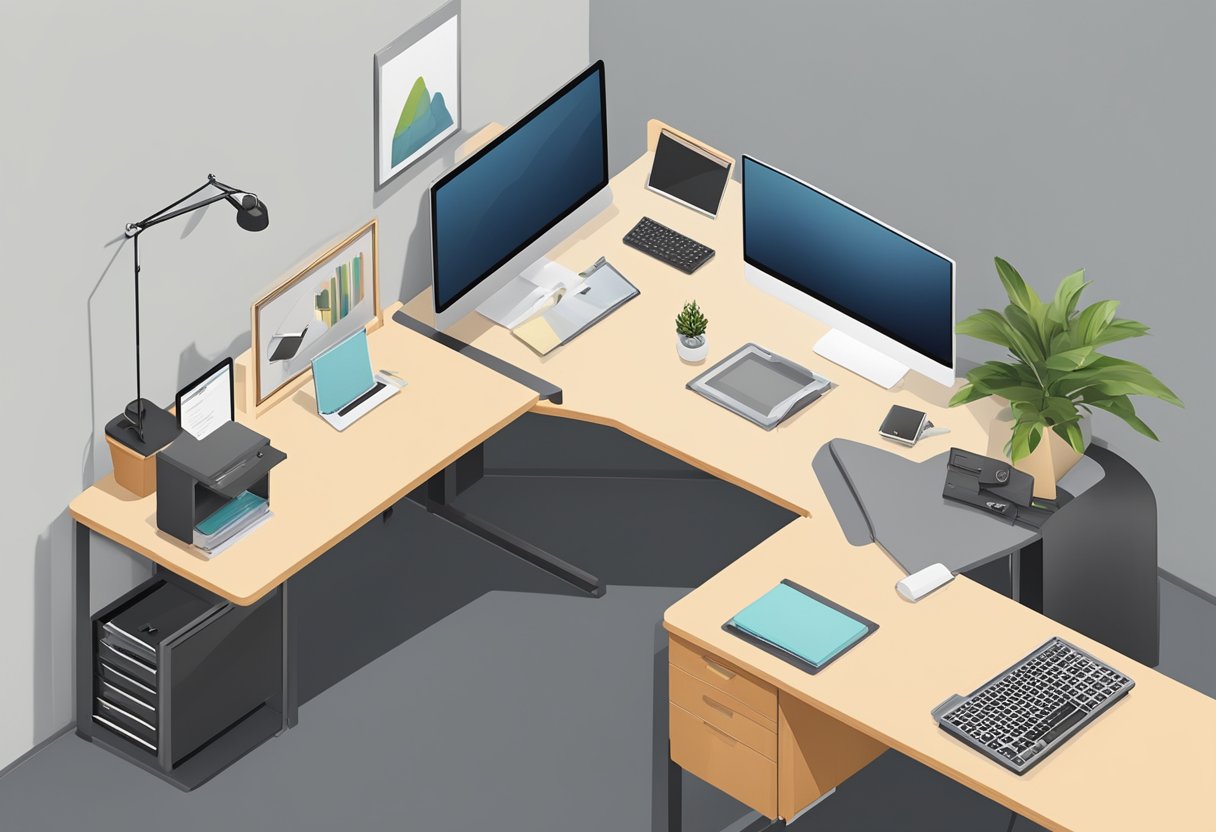
When choosing between an L-shaped desk and a corner desk, it’s important to consider the features and accessories that can enhance your productivity. Here are some key factors to keep in mind:
Surface Area and Storage
Both L-shaped and corner desks can provide ample surface area for your work and storage needs. However, an L-shaped desk typically offers more surface area, which can be especially useful if you need to spread out multiple monitors or work on large projects. Additionally, L-shaped desks often come with built-in storage options like shelves, drawers, and hutches.
Cable and Cord Management
To keep your workspace organized and efficient, it’s important to have a system for managing cables and cords. Look for desks with built-in cord management systems or add-ons like hooks and wire management trays. This can help keep your cables out of sight and prevent them from getting tangled or damaged.
Ergonomics and Adjustability
To avoid discomfort and injury, it’s important to choose a desk that is ergonomically designed and adjustable to your needs. Look for desks with adjustable foot pads, keyboard trays, and monitor stands. Additionally, consider investing in an ergonomic office chair that can support your posture and reduce strain on your back and neck.
Personal Preferences and Extra Features
Ultimately, the best desk for you will depend on your personal preferences and work style. Consider factors like desk height, adjustability, and extra features like outlets, filing cabinets, and stationery organizers. Whether you’re setting up a gaming station or a home office, it’s important to choose a desk that fits your needs and enhances your productivity.
In summary, both L-shaped and corner desks can provide a functional and efficient workspace. Consider your storage needs, cable management, ergonomics, and personal preferences when choosing between the two. With the right features and accessories, you can create a workspace that supports your productivity and helps you achieve your goals.
Frequently Asked Questions
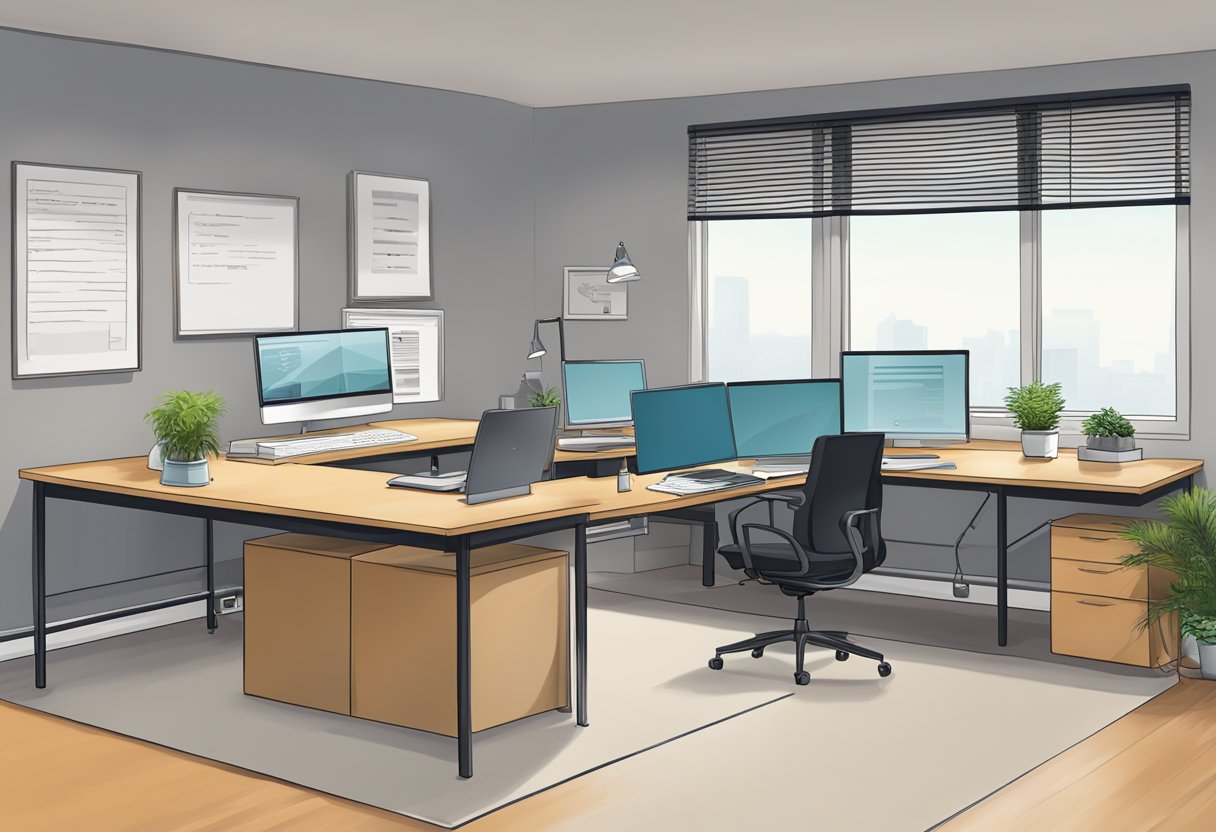
What are the benefits of an L-shaped desk?
An L-shaped desk provides more surface area than a traditional desk, making it easier to spread out your work and keep everything organized. It also allows for more flexibility in terms of placement, as it can be positioned against a wall or in the middle of a room.
What are the benefits of a corner desk?
A corner desk is a great option for maximizing space in a room. It can fit snugly into a corner, freeing up more floor space for other furniture or activities. Additionally, a corner desk can be a good choice for those who prefer a more compact workspace.
Can an L-shaped desk be converted into a corner desk?
In most cases, an L-shaped desk cannot be easily converted into a corner desk. However, some L-shaped desks may be designed to be reversible, allowing you to switch the orientation of the desk to fit into a corner.
What should I consider when choosing between an L-shaped and a corner desk?
When choosing between an L-shaped and a corner desk, consider the amount of space you have available, as well as your specific needs and preferences. L-shaped desks are generally larger and provide more workspace, while corner desks are more compact and better suited for smaller rooms.
Are there any downsides to using an L-shaped or corner desk?
One potential downside of an L-shaped desk is that it may take up more space than a traditional desk, which could be an issue in smaller rooms. A corner desk, on the other hand, may not provide as much workspace as an L-shaped desk.
Which desk shape is more space-efficient?
In general, a corner desk is more space-efficient than an L-shaped desk, as it can fit snugly into a corner and free up more floor space. However, an L-shaped desk may be a better choice if you need more workspace or have a larger room to work with.
Amazon and the Amazon logo are trademarks of Amazon.com, Inc, or its affiliates.
Related Posts
03 Dec, 2023How to Organize Papers Without a Filing Cabinet: Simple Tips and Tricks
03 Dec, 2023Does a Corner Desk Have to Be in a Corner? Exploring the Placement Options
21 Nov, 2023L-Shaped Desk vs Straight Desk: Which is the Better Choice for Your Workspace?
21 Nov, 2023Are Corner Desks More Ergonomic? A Comprehensive Analysis
21 Nov, 2023Corner Desk vs Straight Desk: Which is the Better Option for Your Workspace?
